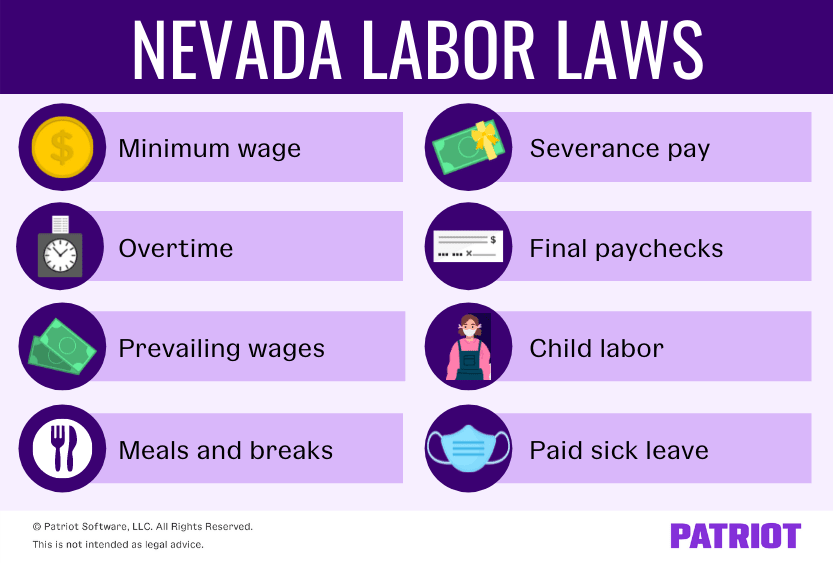As an employer, you’re expected to follow a number of laws to protect your employees and business. Some of these laws fall into the “labor laws” category, which can vary by state. One state that has a unique set of laws is Nevada. And if you’re a Nevada employer, it’s time to get to know the Nevada labor laws like the back of your hand.
What are labor laws?
Labor laws are put in place to protect employees’ rights and determine employer obligations. Common labor laws generally deal with wages, hours, and workplace health and safety.
There are both federal and state labor laws. States can have a different set of rules for things like minimum wage, PTO payout, and final paychecks. If you’re unsure whether to follow a federal or state law, you typically must go by the one that’s most generous or provides the most protection to employees. For example, if the federal minimum wage is $7.25 and your state minimum wage is $8.80, you have to pay the higher of the two ($8.80).
Failing to follow labor laws can result in penalties and criminal charges. And depending on the severity, it may cause you to close your business for good.
To avoid any legal issues and protect your business and its employees, follow labor laws to a T.
Nevada labor laws
Again, labor laws can vary by state. If you’re a Nevada employer, listen up and follow these eight labor laws to keep your workplace compliant.

1. Minimum wage
Minimum wage is the lowest amount you can pay an employee per hour of work. Nevada wage and hour laws state that the minimum wage is $9.75 (2021). Businesses providing health benefits to employees may pay a wage of $1.00 less than the minimum wage, or $8.75 per hour in 2021.
If an employee receives tips, employers must still pay employees at least the state minimum wage in addition to collected tips. There is no tipped minimum wage in Nevada.
2. Overtime
Nevada overtime laws require employers to pay eligible employees an overtime rate of 1.5 times the employee’s regular rate of pay for any hours worked over 40 in a workweek.
Employers must also pay the overtime rate for any hours worked in excess of eight in a workday to employees who are compensated less than 1.5 times the NV minimum wage (unless the worker is exempt).
Not all employees are eligible for Nevada overtime. Exempt employees cannot receive overtime. Only nonexempt employees who are covered under the Fair Labor Standards Act (FLSA) are eligible.
Say your employee makes $20 per hour and worked 45 hours during the workweek. Their overtime rate is $30 ($20 X 1.5), and their overtime pay is $150 ($30 X 5 hours). The employee’s regular wages are $800. So, the employee’s net pay before taxes and deductions is $950 ($800 + $150).
3. Prevailing wages
In some cases, employers in Nevada may need to pay wage rates established by federal or state prevailing wage rules. Prevailing wages are rates for wages and fringe benefits set by the Department of Labor that employers with government contracts or foreign workers must pay employees.
Employees in Nevada may be eligible for prevailing wages if they work on federal or state government or government-funded construction projects or perform certain federal or state government services.
In Nevada, the state public works contract needs to be worth $100,000 for it to apply to your business.
For more information on prevailing wages in Nevada, check out:
4. Meals and breaks
In Nevada, employers must provide employees a meal period of 30 minutes for employees who work eight consecutive hours. Employers must also provide a paid break of at least 10 minutes for every four hours worked. Employees who work three and a half hours or less are not eligible for a break period.
Although employers are required to give employees a meal or rest break by law, employees can forgo them if they would like to.
There are some exceptions to the meal and break requirements:
- Situations where only one person is employed at a place of employment
- Employees included within the provisions of a collective bargaining agreement
- Exemptions granted by the Labor Commission after the employer has shown sufficient evidence that business necessity precludes providing such benefits
5. Severance pay
Some states may require employers to provide severance pay to employees. Severance pay is a payment an employer can offer to an employee if they are terminated or dismissed from employment.
Nevada labor laws do not require employers to provide employees with severance pay. However, if an employer opts to provide severance benefits to employees, they must comply with the terms of the policy or employment contract.
6. Final paychecks
Regardless if you terminate an employee or they quit, you’re responsible for giving the employee their final paycheck. And, you probably guessed it: there are final paycheck laws you need to follow in Nevada.
If an employee quits, you must give them their final paycheck within seven days or by the next regular payday, whichever comes first.
If you fire an employee, they must receive their final wages within three days.
The number of days should exclude the first day and include the last unless the last day is a Saturday, Sunday, or legal holiday. If the last day is a weekend or holiday, the next business day is the last day.
7. Child labor
Child labor laws impact how old a child has to be to work, what jobs and duties they can have, and how late they’re able to work.
In Nevada, minors who are 14 and 15 years old need written permission from a district court judge to work. And, they can only work as a performer or in artistic, athletic, creative, and intellectual industries. A guardian must set aside 15 – 50% of all earnings.
When public school is in session, minors who are age 14 or 15:
- Cannot work during school hours
- May work during school hours if performing in a motion picture
- Cannot work more than three hours per day on school days
- Cannot work more than eight hours per day on non-school days
- Can work a maximum of 18 hours per week
- Cannot work earlier than 7 a.m. or later than 7 p.m.
When public school is not in session, minors 14 and 15:
- Cannot work more than eight hours per day
- Can only work a maximum of 40 hours per week
- Cannot work earlier than 7 a.m. or later than 7 p.m.
Minors ages 16 and 17 cannot work in an establishment that serves or sells alcohol for consumption. And, minors under 18 are prohibited from working in hazardous occupations, including:
- Work involving poisonous chemicals
- Construction
- Mines or quarries
- Smelting
- Work in tobacco or cigar factories
- Distilleries or breweries
- Work with power-driven machinery
- Railroad-related work
- Explosives
When public school is in session, minors under 18:
- Cannot work during school hours
- May work during school hours if performing in a motion picture
- Cannot work more than 48 hours per week
- Can work a maximum of eight hours per day
- Cannot work earlier than 7 a.m. or later than 7 p.m.
- Cannot work earlier than 5 a.m. or later than 10 p.m. if delivering goods or messages
For minors 16 and 17, there are no hour restrictions if the minor is employed in domestic services, as a performer, or as a farmworker.
When school is not in session, minors under 18:
- Cannot work more than eight hours per day
- Can work a maximum of 48 hours per week
- Cannot work earlier than 7 a.m. or later than 7 p.m.
- Cannot work earlier than 5 a.m. or later than 10 p.m. if delivering goods or messages
8. Paid sick leave
Like some other states, Nevada has a variety of rules for paid sick leave. Paid sick leave laws give employees time off for illnesses. And in some states, employees don’t need a reason to take paid sick leave.
Here are some quick facts about NV’s paid sick leave:
- Lets qualifying employees take paid time off for any reason
- Private Nevada employers with 50 or more employees are responsible for providing paid leave to each of their employees
- Employers do not have to comply with Nevada’s paid leave law for the first two years of being in business
- Eligible employees earn at least 0.01923 hours of paid leave per hour worked
- Employers can set a usage cap of 40 hours per employee
- Employees can begin using accrued paid leave on the 90th calendar day of employment
- Employees can carry over 40 years of accrued sick leave per year
For additional information on Nevada’s paid sick leave rules, check out the state’s website.
Keeping up with Nevada state labor laws
Staying up-to-date with labor laws can be challenging, especially when they can potentially change from year to year. To help keep up with Nevada labor laws, check out:
Contact the state of Nevada with any questions you may have about labor laws your business needs to follow. To stay in the loop, consider signing up for state newsletters and notifications and following a payroll blog.
The more in the know you are about your state’s laws, the more you can avoid making mistakes, like underpaying employees.
Need help keeping up with labor laws? Patriot’s online payroll software tracks overtime and employee wages for you. And, our time and attendance software makes it easy to stay compliant with break and paid sick leave requirements. Try them both free for 30 days!
This is not intended as legal advice; for more information, please click here.



